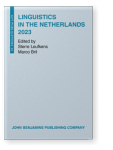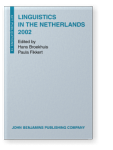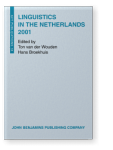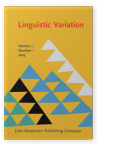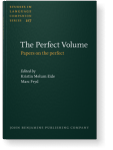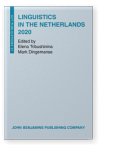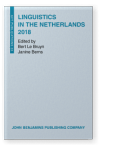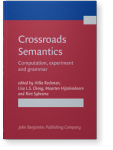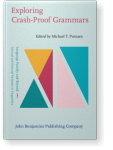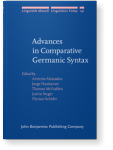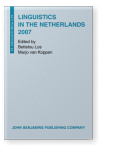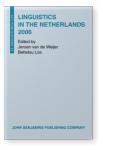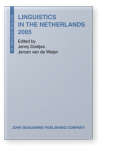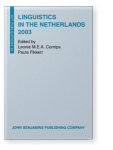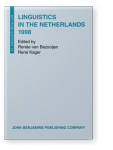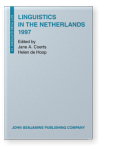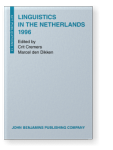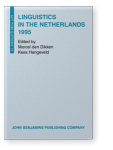Hans Broekhuis
List of John Benjamins publications for which Hans Broekhuis plays a role.
Yearbook
Titles
Linguistics in the Netherlands 2002
Edited by Hans Broekhuis and Paula Fikkert
[Linguistics in the Netherlands, 19] 2002. viii, 222 pp.
Subjects Theoretical linguistics
Linguistics in the Netherlands 2001
Edited by Ton van der Wouden and Hans Broekhuis
[Linguistics in the Netherlands, 18] 2001. viii, 244 pp.
Subjects Theoretical linguistics
2023 VO or OV: V to v or not to v Linguistic Variation 23:2, pp. 343–378 | Article
This article sketches a new analysis of the diachronic development found in many West Germanic languages from a hybrid VO-OV order to a rigid OV or VO order. The discussion departs from the discussions in Struik & Van Kemenade (2020/2022) and Struik & Schoenmakers (to appear) on the diachronic… read more
2021 Chapter 11. The rise of the periphrastic perfect tense in the continental West Germanic languages The Perfect Volume: Papers on the perfect, Eide, Kristin Melum and Marc Fryd (eds.), pp. 261–290 | Chapter
This article adopts the traditional claim in Dutch linguistics that periphrastic perfect-tense constructions gradually developed out of copular-like constructions with have and be. It argues that this development was made possible by the introduction of two morphological rules. The first rule… read more
2020 Clausal ellipsis: Deletion or selective spell-out? Linguistics in the Netherlands 2020, Tribushinina, Elena and Mark Dingemanse (eds.), pp. 23–37 | Article
This article compares two alternatives to the standard movement-and-deletion approach to clausal ellipsis, which postulates deletion of TP after the remnants of ellipsis are (sometimes exceptionally) A′-moved into the left periphery of the clause. One alternative is the in-situ approach, which… read more
2018 The syntax of Dutch gapping Linguistics in the Netherlands 2018, Le Bruyn, Bert and Janine Berns (eds.), pp. 19–33 | Article
This article takes as its point of departure Neijt’s (1979) claim that gapping is a rule of syntax with properties also found in wh-movement constructions. I will refine this proposal by concluding that gapping remnants are A′-moved into the clause-initial position (SpecCP) and/or the specifiers… read more
2017 Chapter 18. The expressive en maar-construction Crossroads Semantics: Computation, experiment and grammar, Reckman, Hilke, Lisa Lai-Shen Cheng, Maarten Hijzelendoorn and Rint Sybesma (eds.), pp. 305–325 | Chapter
Abstract
This article discusses constructions of the type En maar zeuren! ‘You keep on nagging’, which express a negative attitude of the speaker towards the proposition expressed by the construction. We will argue that en ‘and’ should be seen as a regular conjunction conjoining a… read more
2010 A typology of clause structure Linguistic Variation Yearbook 2010, van Craenenbroeck, Jeroen (ed.), pp. 1–31 | Article
Current generative grammar predicts a larger set of transitive structures than the six types normally mentioned in the typological handbooks (SVO, SOV, VSO, etc). The main cause of this discrepancy is that, whereas generative grammar investigates the hierarchical positions of the verb and its… read more
2010 Crash-proof syntax and filters Exploring Crash-Proof Grammars, Putnam, Michael T. (ed.), pp. 245–268 | Article
This article argues that even when it turns out to be possible to develop a crash-proof syntax that only generates well-formed objects that satisfy the interface conditions, filters on the output of the computational system will remain an essential ingredient of the theory of syntax. This does not… read more
2009 Holmberg’s Generalization: Blocking and push up Advances in Comparative Germanic Syntax, Alexiadou, Artemis, Jorge Hankamer, Thomas McFadden, Justin Nuger and Florian Schäfer (eds.), pp. 219–246 | Article
Holmberg’s (1999) formulation of Holmberg’s Generalization states that Scandinavian object shift cannot cross any phonologically realized VP-internal material. This correctly predicts that object shift may not apply in, e.g., embedded clauses in Danish: since in these languages V-to-I applies in… read more
2007 Does defective intervention exist? Linguistics in the Netherlands 2007, Los, Bettelou and Marjo van Koppen (eds.), pp. 49–61 | Article
2006 The universal base hypothesis: VO or OV? Linguistics in the Netherlands 2006, Weijer, Jeroen van de and Bettelou Los (eds.), pp. 28–39 | Article
2005 Locative inversion in English Linguistics in the Netherlands 2005, Doetjes, Jenny and Jeroen van de Weijer (eds.), pp. 49–60 | Article
2003 Participle fronting in Bulgarian as XP-movement Linguistics in the Netherlands 2003, Cornips, Leonie and Paula Fikkert (eds.), pp. 1–12 | Article
2002 Preface Linguistics in the Netherlands 2002, Broekhuis, Hans and Paula Fikkert (eds.), p. | Miscellaneous
2001 Preface Linguistics in the Netherlands 2001, Wouden, Ton van der and Hans Broekhuis (eds.), p. | Miscellaneous
1998 Against Feature Strength Linguistics in the Netherlands 1998, Bezooijen, Renée van and René Kager (eds.), pp. 53–64 | Article
1997 Causative Constructions: The Realization of the Causee Linguistics in the Netherlands 1997, Coerts, Jane A. and Helen de Hoop (eds.), pp. 1–12 | Article
1996 On Heads and the Linear Correspondence Axiom Linguistics in the Netherlands 1996, Cremers, Crit and Marcel den Dikken (eds.), pp. 25–36 | Article
1996 Inalienable possession in locational constructions: An apparent problem Linguistics in the Netherlands 1996, Cremers, Crit and Marcel den Dikken (eds.), pp. 37–48 | Article
1995 The Syntactic Function of the Auxiliaries of Time Linguistics in the Netherlands 1995, Dikken, Marcel den and Kees Hengeveld (eds.), pp. 37–48 | Article
